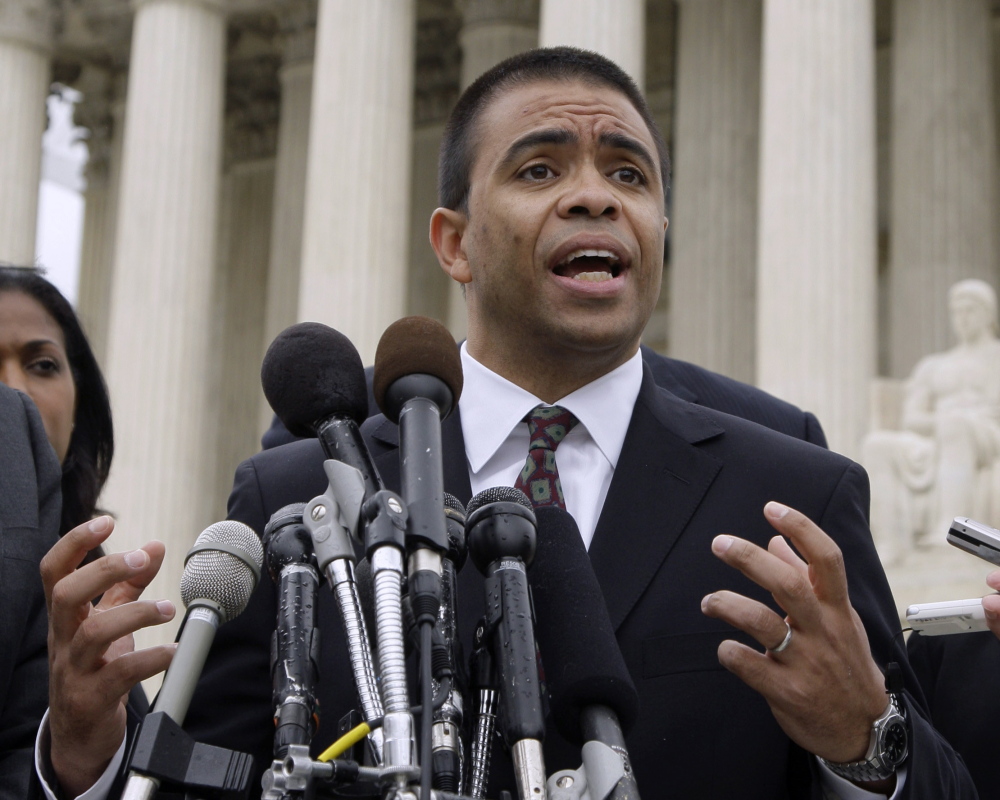WASHINGTON — President Obama’s choice to lead the Justice Department’s Civil Rights Division was blocked by bipartisan opposition in the Senate on Wednesday in an emotional postscript to the long-ago murder of a Philadelphia policeman and the legal help his killer received.
The vote against advancing Debo Adegbile toward confirmation was 47-52, shy of the majority needed under new procedures Democrats put in place late last year to overcome Republican stalling tactics.
In this case, though, to the dismay of civil rights organizations, Democratic desertions played a decisive role in the outcome. Eight members of Obama’s party joined all 44 Republicans in preventing a final vote.
Obama swiftly condemned the action. In a statement, he called it a “travesty based on wildly unfair character attacks against a good and qualified public servant.”
Administration officials declined to say if they would seek a second vote in the hopes they could change the minds of a few Democrats. Majority Leader Sen. Harry Reid, D-Nev., is positioned to call for one after changing his vote to “no” at the last minute.
Adegbile, a longtime official at the NAACP Legal Defense Fund, was praised by supporters for his legal skills and critics leveled few if any objections to his record as an advocate for voting rights cases who has argued before the Supreme Court.
But Republicans, backed by the National Fraternal Order of Police, said Adegbile’s connection with the legal case of Mumia Abu-Jamal disqualified him from holding high public office.
Shortly before the vote, Sen. Pat Toomey, R-Pa., read from a letter written by Maureen Faulkner, the widow of the policeman Abu-Jamal was convicted of killing. “Today, as my husband lies 33 years in his grave, his killer has become a wealthy celebrity,” she wrote.
“Old wounds have once again been ripped open, and additional insult is brought upon our law enforcement community in this country by President Obama’s nomination of Debo Adegbile.”
Supporters of the nomination, including prominent civil rights groups and their allies in the Senate, sought to turn the focus to other instances in which unsavory or controversial defendants received top-shelf legal representation.
Sen. Dick Durbin, D-Ill., noted that a Founding Father, John Adams, “made the very unpopular decision to represent a British solider on the eve of the Revolutionary War.” He added that when Chief Justice John Roberts was confirmed to a lower court position in 2003, “not one senator raised a concern about (him) providing pro-bono representation to a man who had been convicted of killing eight people and was awaiting execution on Florida’s death row.”
Supporters also noted that while Adegbile was working at the NAACP Legal Defense Fund in 2006, when it first intervened in the case years after Abu-Jamal had been convicted, the decision to join the effort was made by another official. In addition, they said that by then, the death sentence in the case had long since been overturned.
He was at the organization from 2004-2013, serving as director of litigation from 2010-2012 and later as acting president. The organization filed a brief on Abu-Jamal’s behalf in 2006, and represented him beginning in 2011, near the end of a 30-year legal struggle that resulted in a lifetime prison sentence.
Republicans were relentless.
Sen. Mitch McConnell of Kentucky, the party leader, recited the details of Faulkner’s death in detail.
GOP chairman Reince Priebus said in a statement that Abegbile had been “a convicted cop killer’s most ardent defender.”
Send questions/comments to the editors.



Comments are no longer available on this story